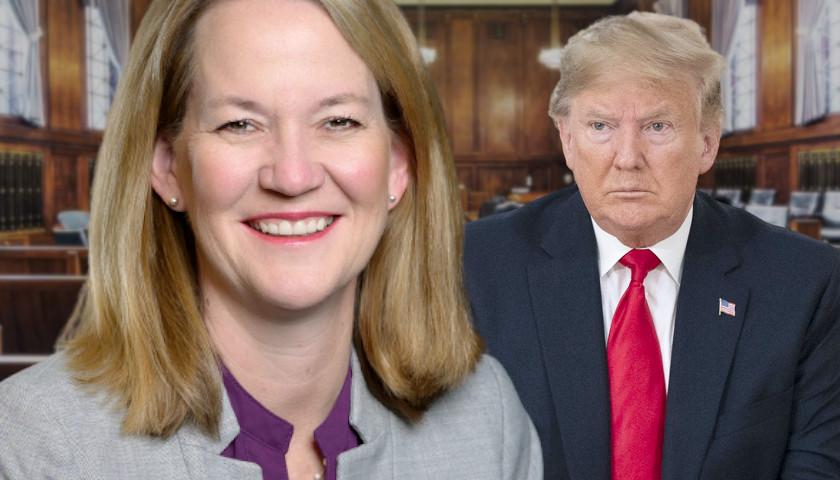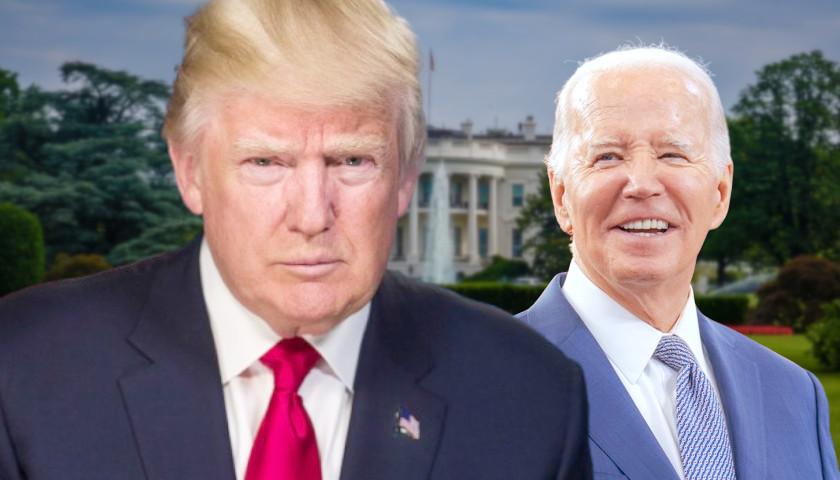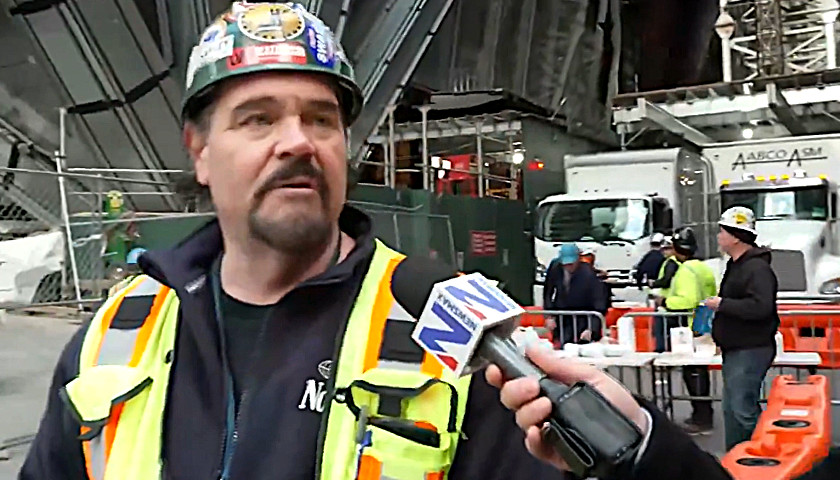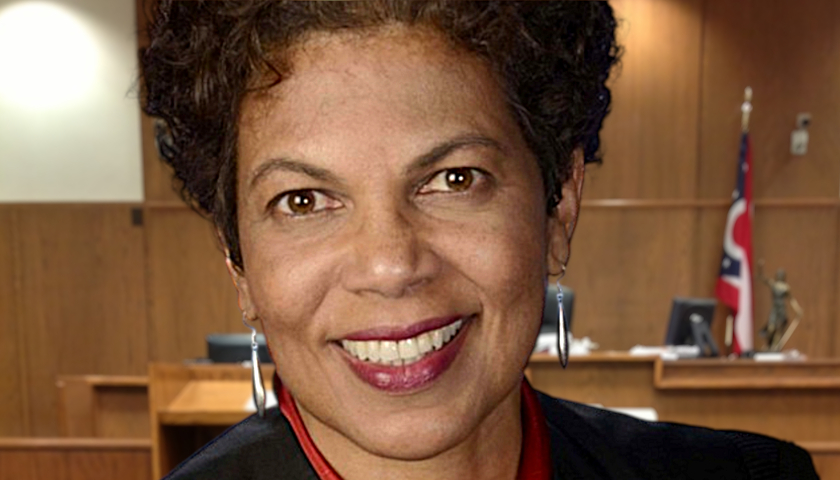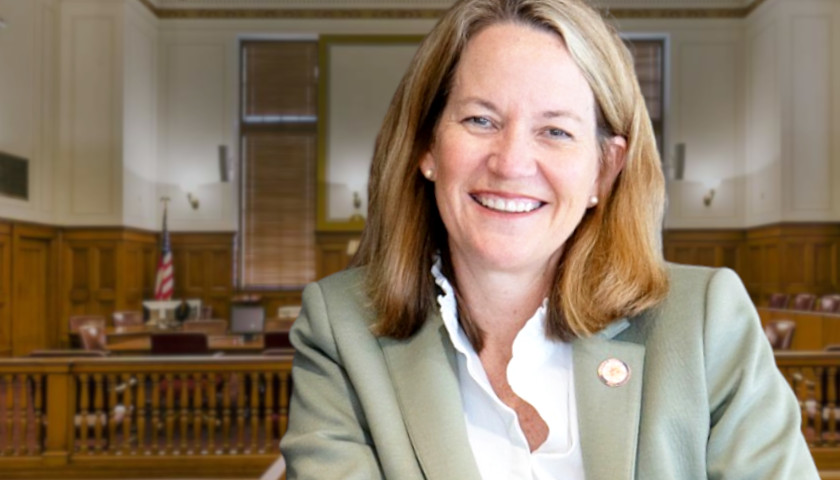Former President Donald Trump has been indicted by grand juries in Washington, D.C. and Georgia over his efforts to challenge election fraud after the 2020 election, and an indictment in Arizona may be next.
As concerns spread that Arizona could soon indict Trump, Arizona Republican Party Chair Jeff DeWit denounced recent news that Democratic Governor Katie Hobbs urged Democratic Attorney General Kris Mayes to charge Trump.
“After seeing Georgia, now Arizona’s Governor @GovernorHobbs is pressuring her Attorney General, a fellow Democrat, to drum up the same charges here in AZ,” DeWit posted on X. “Clearly an abuse of power, much like the revelations last week that Hobbs used the power of her office to pressure social media companies to silence posts from Conservatives. We asked ChatGPT to give these actions a name and it gave us the phrase ‘Authoritarian Suppression’ which sounds right on the money. What would you call these actions?”
Hobbs appeared to state on Tuesday that she believes Trump should be criminally charged, but a spokesperson said later that she “misheard the question” and was “responding generally” about her stance on what should be done with those who break the law.
In the federal D.C. case, Trump was indicted on four federal charges related to trying to overturn the election: conspiracy to defraud the United States, conspiracy to obstruct an official proceeding, an attempt to obstruct an official proceeding, and conspiracy against rights.
In Georgia, Trump was indicted, along with 18 others under the state’s racketeering laws, on multiple conspiracy counts related to election fraud, forgery, false documents, impersonating a public officer, influencing witnesses, and more. All 16 of the alternate slate of electors in Georgia who signed an “unofficial electoral certificate” are under investigation. Arizona has similar racketeering laws, A.R.S. 13-2314 et seq., which Mayes (pictured above) would likely use to go after Trump and others.
Mayes might also consider the alternate state to be faithless electors. Arizona is one of several states with a law against faithless electors, A.R.S. 16-212. However, it is not criminal law. Section (C) of that statute provides, “A presidential elector who knowingly refuses to cast that elector’s electoral college vote as prescribed in subsection B of this section is no longer eligible to hold the office of presidential elector and that office is deemed and declared vacant by operation of law. The chairperson of the state committee of the political party represented by that elector shall appoint a person who is otherwise qualified to be a presidential elector.”
Mayes began investigating the alternate electors earlier this year. There is also a second set of alternate electors that she may be investigating. Labeling itself “The Sovereign Citizens of the Great State of Arizona,” the group of grassroots activists sent signed and notarized certifications to the National Archives and the Arizona Secretary of State’s Office.
Arizona’s attorney general may rely on evidence and interviews obtained from the federal investigation into Arizona’s alternate electors. Special Counsel Jack Smith, who successfully got the D.C. grand jury to indict Trump, has interviewed and subpoenaed about a dozen Arizonans, according to The Washington Post. Federal law enforcement officials sent grand jury subpoenas to two state legislators last year asking them about their communications with the alternate electors, then-Arizona Senate President Karen Fann and then-Senator Kelly Townsend. The subpoena also asked them about their communications with any executive or legislative branch member, the Trump campaign, and 12 others, including several of Trump’s attorneys. Trump’s attorney Kenneth John Chesebro sent an email with attached documents regarding the alternate slate to Arizona Republican Party Executive Director Greg Safsten on December 10, 2020.
Joshua Stanton, counsel at Perry Law based in Washington, D.C., told AZ Central that Trump campaign workers who encouraged the alternate electors could also be indicted. However, he said if the alternate electors only believed their slate would be used if a court ruled in their favor, then they wouldn’t likely be convicted.
“If the false electors, when they signed that form, honestly believed that (they would only be used if the GOP won in court), then it seems likely that they didn’t do anything wrong,” Stanton said. “It would be hard to actually prosecute them.”
A.R.S. 16-212 provides the process for selecting electoral slates in Arizona. It says very little about the specifics; the main portion in (B) states, “After the secretary of state issues the statewide canvass containing the results of a presidential election, the presidential electors of this state shall cast their electoral college votes for the candidate for president and the candidate for vice president who jointly received the highest number of votes in this state as prescribed in the canvass.”
Alternate slates of electors have been submitted previously, including in the 1960 presidential election from Hawaii. A slate was provided by Republicans when it appeared Richard Nixon had won the state, but Democrats offered their own slate when the election was contested and a recount was done. Ultimately, John F. Kennedy prevailed in the recount, and as America’s vice president, Nixon accepted the Democratic slate. No one was prosecuted.
A total of 165 electors throughout history have chosen to vote differently than for the candidate they were pledged to vote for as faithless electors. In 2016, multiple electors worked to alter the result of the election. None of them were prosecuted.
Election attorney Tim LaSota told the Arizona Daily Star that it made sense for Arizona Republicans to select an alternate slate before the deadline, December 8, 2020.
“Even if you end up winning, if you don’t have electors appointed by that date, you’re out of luck,” LaSota said. “The bottom line is that, if you’ve got a court case pending challenging the election, I don’t know how you could fault somebody for preserving their rights with an alternate slate of electors.”
Harvard Law Professor Emeritus and constitutional legal scholar Alan Dershowitz said choosing alternate electoral slates is legal, blasting Smith’s indictment of Trump. “The way you protest an election is to come up with an alternate slate of electors,” he said on Fox News. “That was done in 1960. That was the Tilden Hayes election. That’s been done throughout history. And a court in Hawaii said that’s the right way to do it.”
Representative Paul Gosar (R-AZ-09) objected to Arizona’s slate of Democratic electors on January 6, 2021 and was supported by Senator Ted Cruz (R-Texas).
Watch Rep. Paul Gosar (R-AZ) object to the vote in his home state.
He's met with applause from the GOP. pic.twitter.com/8ldw0RU6AR
— The Recount (@therecount) January 6, 2021
The other states with alternate electors in 2020 were Georgia, Michigan, Nevada, New Mexico, and Pennsylvania. The Georgia indictment references the alternate electors in those states.
The Michigan electors have been charged with eight felonies and released on $1,000 bonds. At least eight of the 16 alternate electors in Georgia have been offered immunity.
The alternate electors in Arizona include:
- Kelli Ward
- Michael Ward
- Nancy Cottle
- Loraine B. Pellegrino
- Tyler Bowyer
- Jake Hoffman
- Anthony T. Kern
- James Lamon
- Robert Montgomery
- Samuel I. Moorhead
- Greg Safsten
None of the alternate electors have been willing to speak to the media.
– – –
Rachel Alexander is a reporter at The Arizona Sun Times and The Star News Network. Follow Rachel on Twitter. Email tips to [email protected].

